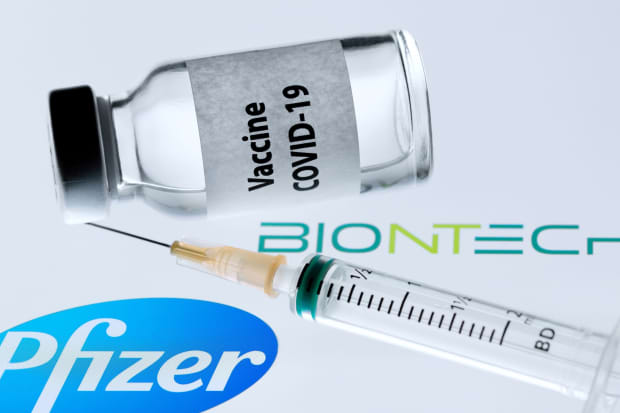This post was originally published on this site

The U.K. will begin vaccinating people most at risk next week after the Pfizer-BioNTech shot was approved for use by the country’s regulators
joel saget/Agence France-Presse/Getty Images
The U.K. has become the first country in the world to approve the Covid-19 vaccine developed by Pfizer PFE, +2.87% of the U.S. and Germany’s BioNTech BNTX, -8.23%, paving the way for the shot to be distributed to people who need it most within days.
The two-shot vaccine was authorized by the U.K. medicines regulator the Medicines and Healthcare products Regulatory Agency (MHRA) ahead of the U.S. and Europe, and will become available from next week, the government said on Wednesday.
Large vaccination centres, in venues such as conference centres, are being set up to rollout the mass immunization program, while around 50 hospitals are also ready to administer the jab, U.K. health secretary Matt Hancock said. The vaccine would also be available from some GPs and pharmacies if they have cold storage facilities.
He added that the rollout would be “challenging” because the shot requires a storage temperature of minus 94 degrees Fahrenheit.
Read: Europeans may be waiting until next year for a COVID-19 vaccine
Shares in Pfizer rose close to 4% in premarket trading, while BioNTech’s stock climbed more than 7% ahead of the U.S. open.
The U.S. Food and Drug Administration is planning to meet on Dec. 10 to review the vaccine Pfizer-BioNTech vaccine and could authorize use of the shot soon after.
The U.K. has already secured 40 million doses of the Pfizer-BioNTech vaccine, which was shown to have an efficacy rate of 95% in people over 65 years in a Phase 3 trial with no major safety concerns.
Around 10 million doses will be available soon, with the first 800,000 – enough to vaccinate 400,000 people – arriving in the country in the coming days.
The vaccine is one of the fastest to be developed – taking just 10 months to come to market compared with the years it typically takes – and marks a major step in fighting the pandemic which has killed more than 1.4 million people worldwide.
“The government has today accepted the recommendation from the independent Medicines and Healthcare products Regulatory Agency (MHRA) to approve Pfizer/BioNTech’s COVID-19 vaccine for use,” the U.K. government said in a statement. “This follows months of rigorous clinical trials and a thorough analysis of the data by experts at the MHRA who have concluded that the vaccine has met its strict standards of safety, quality and effectiveness.”
It added that the NHS – Britain’s state-funded health system – “has decades of experience” in delivering large scale vaccination programmes and will begin putting their extensive preparations into action to provide care and support to all those eligible for vaccination.
The Joint Committee on Vaccination and Immunisation (JCVI) is expected to publish its advice later on Wednesday on which groups of people will be eligible for the shot.
“Help is on the way”, Health secretary Matt Hancock said in a tweet.
He said there would be “three modes of delivery” of the vaccine. “The first is hospitals themselves, which of course we’ve got facilities like this,” he told Sky News, adding that 50 hospitals across the country are already set up and waiting to receive the vaccine.
“Also vaccination centres, which will be big centres where people can go to get vaccinated. They are being set up now,” Hancock said. GPs and pharmacists could also deliver the vaccine if they have cold storage facilities.
He admitted that rolling out the vaccine across the U.K. would be “challenging” because the shot requires a storage temperature of minus 94 degrees Fahrenheit. By comparison, the vaccine being developed by Moderna MRNA, -7.68% needs to be stored at minus 4 degrees Fahrenheit. Pfizer said shippers can maintain the temperature for 10 days unopened which allows for transportation to markets globally.
Read: Moderna asking U.S., European regulators to authorize COVID-19 vaccine for emergency use
CMC Markets analyst Michael Hewson said: “Ultimately even if a vaccination program was to start this month, the fact that two jabs are required means that it’s likely to be several months before we start to see a possible economic benefit in terms of an easing of restrictions, given that medical staff, along with more vulnerable people are likely to be the first to benefit, with the general population at the back of the queue.”
On Sunday, the U.K.’s Department of Health said it had increased its order for a vaccine developed by Moderna from 5 million to 7 million doses, enough for 3.5 million people. Moderna’s experimental shot has shown to be 95% effective in Phase 3 trials.
Albert Bourla, chief executive of Pfizer, said, today’s emergency use authorization in the U.K. marks a “historic moment” in the fight against COVID-19.
“This authorization is a goal we have been working toward since we first declared that science will win, and we applaud the MHRA for their ability to conduct a careful assessment and take timely action to help protect the people of the U.K.,” Bourla said.
“As we anticipate further authorizations and approvals, we are focused on moving with the same level of urgency to safely supply a high-quality vaccine around the world,” he added.
The Pfizer and BioNTech vaccine uses the so-called messenger RNA (mRNA) approach, which instruct cells to create proteins to generate an immune response protecting against a virus.
The U.K. has now secured access to a total of 357 million doses of vaccines from seven different developers. This includes 100 million doses of the vaccine being developed by drugmaker AstraZeneca AZN, +0.07% and the University of Oxford.
Last week, the British government formally asked the MHRA to assess AstraZeneca’s experimental shot vaccine candidate despite some experts raising questions about its trial data.

